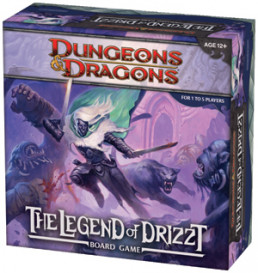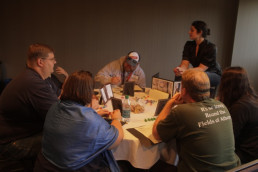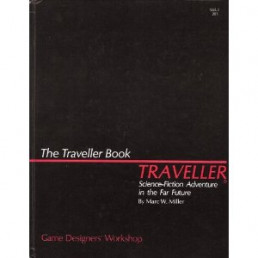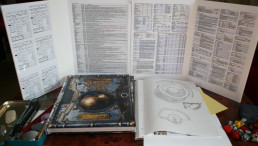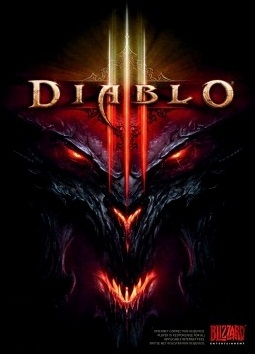The Legend of Drizzt Board Game
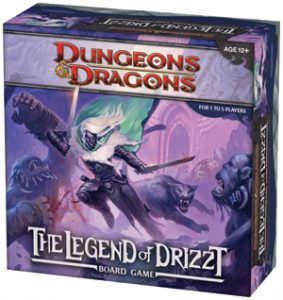 I don't know anything about Drizzt, so when my friends pulled out The Legend of Drizzt board game at a recent tabletop night, I was a bit clueless. I didn't know anything about the characters or the setting, but it didn't matter. I ended up having a great time.
I don't know anything about Drizzt, so when my friends pulled out The Legend of Drizzt board game at a recent tabletop night, I was a bit clueless. I didn't know anything about the characters or the setting, but it didn't matter. I ended up having a great time.
The game is basically a GM-less dungeon crawl. Each player takes a turn playing their character, but then they play the dungeon. To do this, they draw tiles from a pile which randomly add on to the dungeon and change the layout. The player also has to draw from a pile of challenges that will make moving through this new tile challenging, usually this is in the form of a trap. This leads to surprisingly challenging encounters, and although it doesn't lead to the most creative game, the random elements add a lot of excitement to the game.
The combat is easy to pick up and very familiar to regular RPG players. It can also be very challenging since new traps, monsters, and parts of the dungeon are exposed each turn. Some of the monsters are pretty challenging, and the traps and monsters pile up quickly! I really enjoy the slow reveal of the dungeon as players draw tiles nearly every turn. It gives a feeling of suspense that is missing from a lot of minis games, because most GMs simply have the map sitting out in its entirety. I definitely loved the exploration and will try to replicate this feeling in my next game with a dungeon map.
The characters are well balanced, and there are even pregame power choices that make them somewhat customizable. I played an archer, and chose a really powerful shot that blew the target into another dungeon tile. It really became a valuable asset during the big fight at the end, and the game would have played out very differently if I had selected another power. Ever the advocate of player empowerment, I was delighted and surprised by this addition to a board game. There isn't really a role-playing aspect to the game, despite its DnD inspired theme. My usually RP-heavy gaming group did almost none, only occasionally thinking about their characters loyalties when deciding who to aid first in combat. This game is basically an old fashioned dungeon  crawl, with a simple objective, a series of deadly rooms, and a boss lurking somewhere up ahead.
crawl, with a simple objective, a series of deadly rooms, and a boss lurking somewhere up ahead.
I'm definitely planning on buying this game for myself when I pickup my next paycheck. It was great for an impromptu game night. It would also be a great backup for any gaming group in case the GM misses a session or isn't able to prepare an adventure one week. I plan on taking it to future conventions to fill empty time if I don't get into games. Since everything is based on random selection, you can never play the same exact game twice! It also comes with many different ways to run the game to keep it fresh. The Legend of Drizzt board game doesn't match the fun of a real RPG session, but it captures the RPG flavor without any prep time.
You can get a copy of The Legend of Drizzt at Amazon for about $50.
(This article was originally posted on CharismaBonus.com)
Empowering Players
 We all have seen players completely take their GM by surprise. Usually, the GM has planned one or two specific ways for the players to handle a challenge... and the players try something completely different. This creates a crossroad for the game. Is the GM willing to consider alternative solutions to the problem?
We all have seen players completely take their GM by surprise. Usually, the GM has planned one or two specific ways for the players to handle a challenge... and the players try something completely different. This creates a crossroad for the game. Is the GM willing to consider alternative solutions to the problem?
The answer should be "yes."
I'm not saying that the GM should always give in to what the players want, but they SHOULD be open to considering logical solutions other than the ones they planned. When the players' options are allowed, the game changes from the general mice in a maze scenario to a game where players are empowered. The players can stop looking for the "right answer" and really approach the problem from their character's point of view. The mere possibility of creative success supports the role-playing aspect of a game.
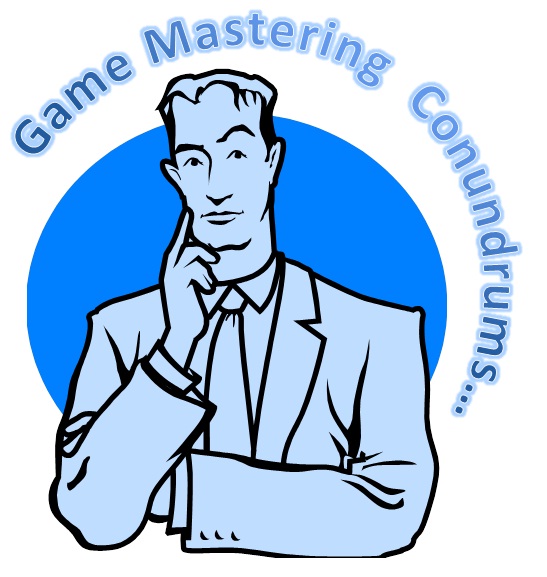 As a GM, there are some important things to keep in mind with this concept. Mainly, just because you let the party try something, DOESN'T mean it has to work. Maybe their logic is off, maybe there are some factors they aren't aware of, or maybe they just roll badly. Let them try it, and let them pay the consequences if they fail. However, if their logic is sound and they roll well, they should be rewarded with success. They shouldn't fail just because it's a different solution than you planned.
As a GM, there are some important things to keep in mind with this concept. Mainly, just because you let the party try something, DOESN'T mean it has to work. Maybe their logic is off, maybe there are some factors they aren't aware of, or maybe they just roll badly. Let them try it, and let them pay the consequences if they fail. However, if their logic is sound and they roll well, they should be rewarded with success. They shouldn't fail just because it's a different solution than you planned.
I saw a great example of this in a recent Pathfinder game. The party was on a pirate ship and planning a mutiny, but they wanted to take out as much of the enemy crew as possible quietly. They decided poison was the best way, but none was available on the ship. They came up with the idea of summoning a viper and milking it for its venom. Although the summoned creature only materialized for a short period of time, they rationalized it by citing the rules that stated anyone poisoned by the viper would stay poisoned after the animal dissipated, thus, the poison didn't dissipate with the creature. The surprised (and delighted) GM ruled in their favor, and a bunch of cruel pirates died mysteriously after their nightly ration of rum.
Keeping your game off "rails" will really benefit the players and the GM. It will encourage the players to explore the world that you create, and to deeply embrace the character that they are playing. The GM gets to enjoy watching the players revel and fully explore the universe they created.
(This article was originally posted on CharismaBonus.com)
Dealing with Player Ignorance

I have GMed many convention games, but I ran into a new problem a few months ago. One of the players in my game had a fundamental misunderstanding of a pretty simple scientific principle. I will not go into specifics because I do not wish to embarrass that player or narrow down which game I am discussing.
The players were engrossed in the game and having a blast trying to come up with a solution to my challenge. They were all great people and it was a very positive game, however suddenly one of them suggested an action that defied the laws of physics. Two other players jumped on board, and the remaining players looked at me with their eyebrows raised.
I casually asked for clarification, hoping they'd catch the mistake themselves. No luck, so I very politely questioned their logic, asking if that was really what they meant to say. Surely, their basic elementary school knowledge was just a little rusty, right? Wrong. They defended their position, restating their faulty understanding of earth science. The logic behind their actions was sound, they just didn't state the right materials to do what they wanted. I was at a crossroad, do I impose my scientific understanding on the game to insure it's correct and risk embarrassing the player, or roll with it and prioritize fun over academic correctness?
Against ever instinct in my teacher body, I rolled with it. Why? Well there were two main reasons.
First, I didn't want to penalize the characters for the players' ignorance. They had found a good solution, but simply did not have the scientific background to choose the right materials to make it work, even though the materials were available to them. Often we play characters with knowledge or qualities different than our own. Shy players can roll skills to give speeches and technology dummies can roll to hack computers, so it didn't seem fair to kill their creative idea when their character would have known exactly the right material to choose.
More importantly, I didn't want to kill the fun. It was a one shot game with people I didn't know well. If it had been my normal gaming group, I might have argued the point and then bought the player a beer. I didn't know these players well enough to push them. They might have gotten mad and walked away, or been perfectly polite but not enjoy the rest of the game. We were all there to have a good time and it seemed pointless to risk that over a small mistake in their plan. That said, if this had been a campaign I would have pressed the point because I wouldn't want the physical laws of my universe to be altered long term, but again, I would know players in a campaign game enough to debate it with them.
Did I make the right choice? I still ponder that question. The game finished smoothly and everyone seemed to enjoy themselves, but maybe they would have enjoyed themselves if their plan had failed. It really boils down to an individual's personal goals for the game. Mine was for my players to enjoy themselves, and I succeeded, but I might not make that same choice again.
Oh, and after the game I casually brought it up to the player privately and suggested they look it up when they got home. The teacher side of me couldn't give up completely.
System Spotlight: Traveller
Are you a fan of Firefly? Do you love the idea of gunslingers on the edge of civilized space? Traveller might be the game for you! In fact, Firefly is so similar to the Traveller universe that I would bet money that Joss has played in a campaign or two.
Traveller (yes, it's spelled like that) was first published in 1977 by Game Designers Workshop. It's a d6 system, but the dice mechanics vary slightly from edition to edition. I suggest the Mongoose version of Traveller, which is a 2d6 system where you usually want to roll high.
Originally, Traveller had no specific setting and was meant to be a generic system for all types science fiction gaming. It can still be used that way, but modern Traveller also has one of the most developed settings in the RPG world. There are THOUSANDS of complete star systems already designed and mapped out. People have not wasted time since 1977! Each of the tens of thousands of planets is planned out to include the important physical, social, and economic information about that planet. Check out travellermap.com for a fully functional map of the universe that can easily be used in your game.
 The Official Traveller Universe is the "Third Imperium", a human-dominated feudalistic society of worlds. Everything in the Empire is run by a class of nobles, but as you get farther and farther from the center of the Empire, things become less civilized and much more wild west! There are multiple races, but it is a human-centric game. The most interesting tidbit about the setting is that while ships can travel pretty quickly through systems, the center of the Empire is many months or even years away from some of the outlying systems... and communication cannot go faster than the ships. If you are out of range to contact someone via communicator, you have to send them a message via a courier ship, also known as an X-boat. This may seem like a big damper on the sci-fi aspect, but it adds so much to the game. This is what lets the outer reaches of the Empire be a pretty wild and lets your crew avoid arrest by staying one jump ahead of the arrest warrant, or make some good money if you end up on a good X-boat. (See? I told you it was like Firefly...)
The Official Traveller Universe is the "Third Imperium", a human-dominated feudalistic society of worlds. Everything in the Empire is run by a class of nobles, but as you get farther and farther from the center of the Empire, things become less civilized and much more wild west! There are multiple races, but it is a human-centric game. The most interesting tidbit about the setting is that while ships can travel pretty quickly through systems, the center of the Empire is many months or even years away from some of the outlying systems... and communication cannot go faster than the ships. If you are out of range to contact someone via communicator, you have to send them a message via a courier ship, also known as an X-boat. This may seem like a big damper on the sci-fi aspect, but it adds so much to the game. This is what lets the outer reaches of the Empire be a pretty wild and lets your crew avoid arrest by staying one jump ahead of the arrest warrant, or make some good money if you end up on a good X-boat. (See? I told you it was like Firefly...)
 Without a doubt, everyone's favorite thing about Traveller is the character creation system. The player gets to make choices during creation, but everything really comes down to die rolls. It's almost a separate game unto itself and gives players a skeletal back story for their character, including ties to other members of the party and skills they have learned along the way. The dice determine that you left military service with PTSD, but it's up to the player to flesh out the story. Are you devoted to another player because they saved your life? Do you hate the Navy for sending you to die? If you approach it with an open mind you can get an incredible character that you would never have created without the help of the dice.
Without a doubt, everyone's favorite thing about Traveller is the character creation system. The player gets to make choices during creation, but everything really comes down to die rolls. It's almost a separate game unto itself and gives players a skeletal back story for their character, including ties to other members of the party and skills they have learned along the way. The dice determine that you left military service with PTSD, but it's up to the player to flesh out the story. Are you devoted to another player because they saved your life? Do you hate the Navy for sending you to die? If you approach it with an open mind you can get an incredible character that you would never have created without the help of the dice.
The Traveller Core Rulebook is all you really need to run a game, although there are other Traveller books available if you end up wanting more options. Try it! It rocks!
(This article was originally posted on CharismaBonus.com)
Comprehending Cross-Gender Characters
Cross-gender role-playing can be a controversial topic at the gaming table. Opinions are as varied as one could imagine and while some gaming groups are very open to cross-gender characters, other groups are flat out against it. So why is something that has been around since role-playing began such a big deal?
Women are partially to blame. The number of female tabletop gamers has been growing for many years and co-ed games can make people uncomfortable with portraying the opposite sex. After I posed the question on Twitter, one man likened it to faking a British accent with a British person at the table. The pressure to "do it right" can take a lot of the fun out of role-playing, even if the other players at the table aren't judging you. I was very worried about portraying a man "right" the first time I cross-gender role-played, and it showed. It was our third or fourth session before I really hit my stride and stopped second guessing myself before speaking. I've seen the same thing happen with men playing female characters. Social pressure can paralyze a person's creativity and role-playing ability.
Everyone worries about being judged by others, and good communication is the key to insuring that everyone enjoys your game. If you are worried about insulting a person in your game by portraying the opposite sex, warn them ahead of time. Please notice, I didn't say to ask permission, because only the GM should have the power to veto a character concept. Just give the other player a heads up, and if it's your first time playing a cross-gender character, maybe ask for some tips. In my experience, it doesn't matter if you screw up from time to time. If it's obvious you are really trying to create a cool character most people will be very supportive.
Sadly, there are those people who seem to play cross-gender characters just to make other players uncomfortable. I have seen this happen with players of both genders, but I think it's more common for women to be upset in this way. Usually, this happens when you are in a gaming group of people that you don't know well. Now, really insulting a normal, reasonable gamer is harder than you'd think. Playing an unintelligent woman who loves shoes isn't necessarily insulting to women (or original), but playing an unintelligent woman who trades sexual favors for shoes every time the party stops in town is something else. The difference is that the player is taking a specific action to demean the character in a way that relates to their gender. As a woman, I can forgive someone for playing a little bit of a stereotype. I cannot ignore someone treating a female character as a sausage wallet to satisfy their own sexual or misogynistic fantasies.
If you are uncomfortable in a game talk about it. Ninety-seven percent of gamers are great people who are not setting out to insult you. Usually if you can have a calm conversation they will try to fix things in future games. If you are not comfortable speaking directly to the other player or if the other player doesn't agree with you, speak with your GM. You are as important as any other player at the table and if someone's role-playing is making you uncomfortable, it's important that the situation is fixed. Be logical, non-judgmental, calm, and have the first conversation in private. Nobody likes to have their mistakes pointed out in front of their friends, so having the approaching them in private increases your chances of really being heard. Also, take action immediately when something unacceptable happens at the table. Get in touch with the player or GM after the session or when your group takes a dinner break. If you say nothing, you are setting the precedent that things of that nature are acceptable. It's sad that some boundaries need to be pointed out, but to be perfectly honest, some gamers need help with social cues and understanding that some actions aren't ok, even if they fit with their idea of a character. (Sheesh, there I go stereotyping...)
What is the most important thing to remember about playing with cross-gender players? Relax. Don't try to psychoanalyze them. It doesn't mean that they are homosexual, have penis/vagina envy, mommy issues, need to get laid, or anything else. Most players just try it as a change of pace or for a new challenge. If you aren't interested in playing a cross-gender character, fine, but be open minded with those who want to try it. The purpose of gaming is to enjoy ourselves. Some of us do that by playing characters very similar to our real selves, some of us love to try out completely different personalities for a few hours. Whatever your preference, the purpose is for everyone to have fun! It is a game after all.
(This article was originally posted on CharismaBonus.com)
Jumping into GMing

GameMASTER. The title itself has a way of excluding about half the population, and that fact is reflected in every game shop and on every convention floor. The number of female gamers may be rising, but the number of female GMs is still pathetically low by comparison. This has to change if we are going to continue to grow as a demographic.
GMing is something that every gamer should do at least once. It's an incredibly educational experience, and even if it doesn't end up being something that you stick with, you will be a better gamer for giving it a try. I was terrified the first time I ran a game, and consequently over prepped my game. It was a 4e game, based in a fantasy ocean world that I created called Nenesto. I had such a blast coming up with the NPCs, the cultures, and the challenges! I completely fell in love with the creative process and the power... THE POWER!! MWAHAHA... ahem. To date, I have run more than twice as many convention games as I have played in. Once the GMing bug bites, it doesn't let go, girls!
I have never run an adventure path or company published scenario for a group of players. I know that a lot of GMs start this way, and it can be very enjoyable. I've had a blast playing in many published campaigns, but I find that it is harder to run a game like that than just create my own world. No, I'm not crazy. Actually, I would argue that it would be easier for most people once they got over their fear of trying. Think back to when you were a kid. You had to study and practice the information that people gave you to learn, but you always could remember the smallest details about the stories, games, and worlds that you dreamed up yourself. It's much the same with self-created gaming worlds. I created the details of the world, so it's harder to forget them or mess them up... and if for some reason I do mess up, it's really easy for me to change to world to accommodate my mistake.
But how does one start to attempt such a daunting task as creating a game from scratch? First, you need to find a group of (kind) players. I was lucky enough to already have a gaming group that encouraged me to try GMing, but if you aren't so lucky, try recruiting friends and family members. Even if you end up running a game for two people who aren't gamers, it will be great practice and break the ice for you. Actually, running your first game for non-gamers has it's advantages. They are less likely to notice your mistakes, and you get a lot of practice explaining the system mechanics to them. I do not recommend running your first game for a group of strangers at a gaming store or convention, because you never know what type of players you will get.

After you have your players, pick your system. It should be a system that you are pretty familiar with, ideally one that you have played a lot. I recommend this because the more you know about the mechanics of a system, the easier it will be to tailor a good story around it and keep your game running smoothly. Have most of the basic combat and skill stuff memorized or on cheat sheets so you don't waste your players' game time looking stuff up. Cheat sheets are your friend! I'm convinced that's why the GM screen was originally invented. Another great trick is to have more obscure combat rules other important information marked so you can easily find it. Your mind will go blank at some point and it's great to be able to quickly find that info. My Wild Talents book is covered in multicolored sticky tabs for this very reason. Your players will appreciate your efficiency and be impressed that you are so prepared. Make no mistake, they will always do the one thing that you can't remember the mechanic for... darn players!
Step three, create your world based on something you know and love. Most likely the system you picked has errata with details about races, monsters, kingdoms/cities, etc. Feel free to use it or lose it. Don't feel that because you are running a DnD game that you HAVE to have dwarves, elves, and all the usual DnD suspects. Maybe your world only has humans, or maybe it takes place completely underground in the dwarven cities. It is YOUR world. Also, don't be afraid to go in a completely different direction than the game designers intended. One of the most successful games I have ever run was a Wild Talents game (a superhero system) about the Salem Witch Trials. The poor puritans started developing powers and panicked because they assumed it was the devil's work. What made it so great? I picked something I knew well and was passionate about. I'm a history teacher by day, and my love for the setting made the players equally passionate. You know your game is a success when they are standing up in the middle of a convention room yelling at each other completely in  character, and completely oblivious to the other games around them. It's those moments that I live for as a GM. Do you know everything about Tolkien's elves? Are you a huge Firefly fan? Could you write encyclopedias about vampires in your sleep? Those will be your most successful games. (This also comes in handy when you have a really knowledgeable player! One of my players for the Salem game had recently taken a class on the Witch Trials, so it was a good thing I knew my stuff!)
character, and completely oblivious to the other games around them. It's those moments that I live for as a GM. Do you know everything about Tolkien's elves? Are you a huge Firefly fan? Could you write encyclopedias about vampires in your sleep? Those will be your most successful games. (This also comes in handy when you have a really knowledgeable player! One of my players for the Salem game had recently taken a class on the Witch Trials, so it was a good thing I knew my stuff!)
After you have your system and your world imagined, start refining it into a (somewhat) linear plot. Just like writing stories, start with a basic outline and then slowly add in the details. For your first time, stick to a one-shot game that can be completed in four to six hours. Remember, the world that you created can be used again and again so all that prep isn't a waste for one game. Your adventuring party might save a specific kingdom from a demon, but there are many more kingdoms for them (or other players) to explore! Don't feel like you have to cram all of your creative material into one game. Keep it secret, keep it safe, then use it later.
I will be providing more helpful advice on GMing specific types of games in future posts, but the first step is always the hardest. Don't be afraid to "borrow" ideas from your favorite source material and realize that you will make mistakes, and that is ok! Be secure in the knowledge that EVERY GM screws up sometimes, and jump in with both feet.
(This article was originally posted on CharismaBonus.com)
Acquiring Accents for RPGs
 Accents are one of the most powerful tools in a role-player's arsenal. Using them can make characters stand out at the gaming table, and differentiate between in character and out of character comments. They can also be the difference between a good GM and an incredible GM who truly immerses players in their world. Why narrate a story? Bring out your inner thespian and BECOME your story.
Accents are one of the most powerful tools in a role-player's arsenal. Using them can make characters stand out at the gaming table, and differentiate between in character and out of character comments. They can also be the difference between a good GM and an incredible GM who truly immerses players in their world. Why narrate a story? Bring out your inner thespian and BECOME your story.
First of all, research whatever accent you'd like to try, or shop around for an accent that you can mimic fairly well. One of the best tools for listening to accents is the internet, specifically videos. Search for "regional dialect meme" on Youtube and you will get a ton of options from all over the world. This meme is particularly helpful because it includes many words and sounds, but it also includes regional terms. For example, is it "soda" or "pop"? These terms can be awesome little details to add to your characters and really unify a group of characters that are from the same place.
Remember, it's ok if you aren't perfect at first, and you really will get better as you go. Hell, it's an RPG! Unless you are playing a historical game, who's to say your accent isn't perfect? Maybe the people from that land over the mountains sound exactly like your bad Jamaican accent. There are a large number of Russian/Irish accented characters in my games... who start to sound more Irish as I drink. Go fig.

Accents are regional, not racial. In a recent season of the Happy Jack's RPG Podcast, another host started speaking like a southern character from one of our games. The character was named Windy Drawers, and he was a sloppy, overeating, unintelligent politician. We instantly started receiving angry emails from people who were upset that we were depicting such an unflattering African American stereotype on our show, however we had never mentioned Windy Drawers' race on that episode of the podcast. In our game he was actually a rich southern white man, but listeners drew their own conclusions based on their own racial stereotypes. Let me say it again, accents are regional, not racial. They are determined by where you grew up and lived, not by your ethnicity or species.
This is a very important distinction that is often overlooked in gaming... and in the media. The stereotypical dwarf may have a Scottish accent, but if he was raised by elves (oh, the horror!) he will sound more like an elf than his dwarf kinsmen. Humans from different parts of the world should have different accents, and drow should not sound like surface elves... unless they were raised together! A good player or GM will use this in their games. An NPC shows up claiming to be from a local town, but speaks differently than everyone there... clue #1 for the party. Maybe it's your half-elf's first adventure with this band and you're getting to know them along the way? Your Irish/British/Russian/common accent tells them that you were raised by the human side of the family, not the elves. They add depth and complexity to a character instantly, that could only otherwise come from sharing written back stories or long in-game explanations.
Here are some easy tips for mastering an accent:
- Find a phrase that will immediately bring you back into your accent. Usually, this is something very stereotypical that you almost can't imagine being said in any other accent. For my Irish accent I use the phrase "Jesus, Mary, and Joseph!" because it's VERY Irish, and it's easy to fit into many different situations. It's like hitting the refresh button on my Irish lilt.
- Listen to your chosen accent as much as possible. Watch Braveheart 4 more times, or whatever movie has the accent you are trying to mimic. Audio books are also a great option since they are easy to get and reasonably priced. The more you hear the accent the easier it will be for you to imagine it in your head later when you are trying to use it.
- Practice! The more you use your accent, the better it will sound. Talk along with your favorite movie character with that accent, repeat commercials on the radio or read street signs while you're driving in the car. I practice in the car a lot because nobody can hear how awful I sound.
- Anticipate what words you are going to use a lot in the campaign and practice them extra! For example, if you are a German spy in a pulp game, you might be dealing with lots of military equipment, location names, etc. You will probably never have to use the words "elf", "dwarf", or "dragon", so stick to what you'll need. Bonus points for learning and using regional terms or words from their native language!
- Did I mention that you should practice? Seriously, do it. You don't want your first try at an accent to be while you're sitting at the gaming table. Trust me on this, I learned this the hard way.
Hollywood & Heroes Charity Event
![]() The Emerald Knights comic and game shop is hosting a huge event this Sat, June 9th from 12pm to 7pm. The event supports the Shriner's Hospital for Children, so join us for the fun and some good karma. It will be a day of games, signings, photo opps, and much more! Lots of geek-famous actors will be there, including members of The Guild, and over 40 cosplayers, including myself! There are also items being auctioned off on the EK auction page.
The Emerald Knights comic and game shop is hosting a huge event this Sat, June 9th from 12pm to 7pm. The event supports the Shriner's Hospital for Children, so join us for the fun and some good karma. It will be a day of games, signings, photo opps, and much more! Lots of geek-famous actors will be there, including members of The Guild, and over 40 cosplayers, including myself! There are also items being auctioned off on the EK auction page.
I will be dressed as Wonder Woman all afternoon. I will also be playing in some RPGs, spreading word about the Happy Jack's RPG podcast, posing for pictures, and visiting with everyone. Rumor has it that I may also be running a DC themed Wild Talents game...
I hope to see a lot of familiar faces on Saturday! More info can be found on the Emerald Knights website, or by contacting the shop.
Diving into Diablo III
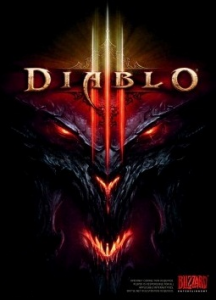 After finishing Act II in Diablo III, I finally feel like I have experience enough of the game to write about it. I'm having a blast, but there are definitely some pros and cons to this long-awaited game.
After finishing Act II in Diablo III, I finally feel like I have experience enough of the game to write about it. I'm having a blast, but there are definitely some pros and cons to this long-awaited game.
First off, if you aren't playing in elective mode, you are playing with training wheels on. Elective mode lets you place any skill you want on whichever hotkeys you prefer to use. This gives experienced gamers a lot more flexibility, but also runs the risk of new players making unbalanced builds that could limit their effectiveness. I highly recommend that you turn it on as soon as possible!
PROS
- It's the familiar Diablo we all loved, but sexier. Like running into an old friend from middle school on your first day of college and finding out that he's an underwear model now...ahem... not that I'd know what that's like. Anyway, the game looks amazing.
 - The classes are really great and well thought out. I'm playing a Monk and am having a great time. I frequently party with a demon hunter and a barbarian, and each loves playing their class just as much as I love mine. Each character's skills are very useful, but still fit with the theme of their class.
- The classes are really great and well thought out. I'm playing a Monk and am having a great time. I frequently party with a demon hunter and a barbarian, and each loves playing their class just as much as I love mine. Each character's skills are very useful, but still fit with the theme of their class.
- Tiered difficulty is a great aspect of the game. The game becomes more challenging based on the number of people in the party, and this keeps it interesting.
- Friends! The battle.net friend system first appeared in World of Warcraft, but it's a wonderful addition to Diablo III. I can easily contact my gaming buddies and party up, and the transition from single player to multiplayer is almost seamless. It has all the perks of an MMO, but none of the spammers, monthly fees, or guild drama.
CONS
- Linear gameplay. Like... insanely linear. You can't even walk off the edges of cliffs because it would mess up the story. I expected this, but after Skyrim it took a while for me to get used to it again. It might be nice to have some extra side quests to help village people for some extra XP.
- Incredibly predictable quests. You know exactly how things are going to play out within the first few moments of each quest. I'd like to have seen a bit more thought put into surprising us. "No way... the creepy mage with the menacing laugh ends up betraying us? Shocking... not."
- Overpowered PCs are a bit of a problem. I felt WAY overpowered in the beta, but that was expected. I still feel that I am rather overpowered as a PC currently, and have yet to really be worried in a fight. This makes the game lose some of it's excitement and challenge. The only thing that seems dangerous in the game is the poisons, and those seem too deadly for what they are! I'm still in "normal" difficulty, so this may just be softening players up for the horrors of the Nightmare, Hell, and Inferno modes. Hardcore mode is an option, but I don't feel like having a video game character's death be permanent.
- RP options... or complete lack thereof. I'd have loved for there to be a little customization to the RP part of the story. Sometimes my character spouts out things that seem really dumb. I would never have had her say anything remotely like that. It would be nice to have some options in the quest conversations, even if they ended up leading to the same quest events.
- Friends. I love my battle.net friends. Really, I do. Most of them are my very dear friends from my tabletop groups, but I would sometimes like to be able to play alone without people chatting me up or trying to form a party. Why on earth isn't there an "offline" or "hidden" feature on the friends list? Not that I'd ever use it... *cough* *cough*
 Despite these few flaws, I am loving Diablo III and have sunk a huge portion of my recent life into it. I do hope that they continue to improve on the battle.net system and the servers, but I have been lucky enough to have very few problems with either.
Despite these few flaws, I am loving Diablo III and have sunk a huge portion of my recent life into it. I do hope that they continue to improve on the battle.net system and the servers, but I have been lucky enough to have very few problems with either.
PRO TIP: DON'T ADD YOUR BOSS OR COWORKERS TO YOUR BATTLE.NET ACCOUNT! It really puts a damper on those "sick" days when you get back to work and your boss knows you were online for 19 hours straight.
Farewell to Fear... or Fun?
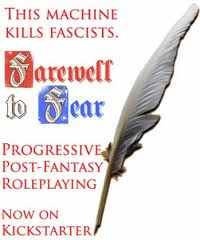 Many people love to complain about what is wrong with the world, but do little or nothing about it. That is not the case with David Hill Jr. of Machine Age Productions. He didn't like the accepted norms of the average fantasy RPG's setting, so he created a completely new RPG system. His new game, called "Farewell to Fear", has raised over $16,000 on Kickstarter, and focuses on bringing political correctness to the RPG fantasy genre. David claims his game is a "Progressive Post-Fantasy RPG". What does he mean by that? Well according to his Kickstarter page:
Many people love to complain about what is wrong with the world, but do little or nothing about it. That is not the case with David Hill Jr. of Machine Age Productions. He didn't like the accepted norms of the average fantasy RPG's setting, so he created a completely new RPG system. His new game, called "Farewell to Fear", has raised over $16,000 on Kickstarter, and focuses on bringing political correctness to the RPG fantasy genre. David claims his game is a "Progressive Post-Fantasy RPG". What does he mean by that? Well according to his Kickstarter page:
Fantasy’s full of all sorts of legacy concepts that are rather disgusting to us; sexism, classism, racism, institutional violence, those are just a few choice items. Farewell to Fear is a game about revolution, about taking fantasy out of the dark ages through drive and action.
Think punk rock meets fantasy. Bad Religion meets Tolkien, boot to face.
Don't get me started on that last comment. It shows a total lack of knowledge of Tolkien's work or its revolutionary impact on the fantasy genre.
Although the information I can find is rather ambiguous, it seems like the focus of this game will be for players to portray normal people, fighting against political incorrectness and unfairness. I applaud Mr. Hill for spending so much time creating a game that embodies so many of his personal beliefs, but despite my love of new tabletop systems, I don't think I want to play his game.
 Why? Because it sounds like every other fantasy game out there, only with more limitations on plot, overall creativity, and roleplaying. The entire concept of this system is that the PCs fight against "the man", who we assume is to blame for the sexism, racism, etc. Already that drastically limits the creativity of the GM to create plots because they have to be about social justice. It also drastically limits the types of characters that the players can create because the PCs have to have the desire to fight the wrongs in society, but not be afraid to rebel against the current institutions that are in place. Party conflict and drama is going to be pretty hard to drum up in a group of incredibly similar characters. Maybe they can't agree on whether to fight racism or sexism today?
Why? Because it sounds like every other fantasy game out there, only with more limitations on plot, overall creativity, and roleplaying. The entire concept of this system is that the PCs fight against "the man", who we assume is to blame for the sexism, racism, etc. Already that drastically limits the creativity of the GM to create plots because they have to be about social justice. It also drastically limits the types of characters that the players can create because the PCs have to have the desire to fight the wrongs in society, but not be afraid to rebel against the current institutions that are in place. Party conflict and drama is going to be pretty hard to drum up in a group of incredibly similar characters. Maybe they can't agree on whether to fight racism or sexism today?
It seems like the whole "Farewell to Fear" concept would be better suited to be published as an adventure path, rather then a game unto itself. They claim that the scientific method is the inspiration for their main mechanic.
The main game system is inspired by the scientific method. Instead of a huge focus on pass/fail mechanics, we’re mostly concerned about finding solutions through conjecture, precedent, and experimentation.
Ok, but how do I hit that guy over there with my sword? The actual dice mechanic spelled out on their Kickstarter page is rather vague, but it doesn't sound very revolutionary to me (unless you've never played anything but D&D). Why design a completely new set of mechanics for something that could easily be used as a skin to lay over an existing, proven system? If you want something other than a pass/fail mechanic, check out the ORE system. For that you roll for the speed and quality of your action, and it is very applicable to situations like archeological digs, performing music, or very intense combat. Why reinvent the wheel? And how many times are your players going to want to play with that same wheel if you put it on a track with limited customization?
over an existing, proven system? If you want something other than a pass/fail mechanic, check out the ORE system. For that you roll for the speed and quality of your action, and it is very applicable to situations like archeological digs, performing music, or very intense combat. Why reinvent the wheel? And how many times are your players going to want to play with that same wheel if you put it on a track with limited customization?
As a woman of mixed ethnicity, I've experience my share of discrimination in my life. I am wholeheartedly against any type of discrimination, hatred, or unfair treatment between players at the gaming table. A game that could fight the imbalance at the table but still be fun would be truly revolutionary. This game does not fight the inequality that happens to players, it only lets them fight injustices that happen in an imaginary Medieval Europe-based world, which is possible in almost any RPG if the GM wants the story to go that way. In fact, it reminds me of quite a few GM created games that I've played in (and created) for D&D4e, Wild Talents, Traveller, and other systems. (This project's Kickstarter video also claims that peasants in the middle ages studied laws to better their situations, and that women held more power than men... as a Medieval history teacher, I'd love to see their sources for that info...)
 My big question? If you are trying to break the traditional RPG mold, why would you choose the most stereotypical setting possible as a foundation? Mr. Hill claims to be improving on the traditional Tolkien fantasy model (sorry... I can't just let that slide) but it sounds like he wants players to behave just like Sam and Frodo. They are normal folk, facing the evils of this world to protect their village's freedom. Or just like Gandalf, who despite being a virtual demi-god, puts the future of Arda in the hands of a minority group (hobbits). Maybe Mr. Hill has forgotten these small plot points, or how Gimli and Legolas broke down the barriers of hatred between their two races and became lifelong friends? Or Eowyn, a noblewoman who successfully kills the Lord of the Nazgul!?!?! I told you not to get me started...
My big question? If you are trying to break the traditional RPG mold, why would you choose the most stereotypical setting possible as a foundation? Mr. Hill claims to be improving on the traditional Tolkien fantasy model (sorry... I can't just let that slide) but it sounds like he wants players to behave just like Sam and Frodo. They are normal folk, facing the evils of this world to protect their village's freedom. Or just like Gandalf, who despite being a virtual demi-god, puts the future of Arda in the hands of a minority group (hobbits). Maybe Mr. Hill has forgotten these small plot points, or how Gimli and Legolas broke down the barriers of hatred between their two races and became lifelong friends? Or Eowyn, a noblewoman who successfully kills the Lord of the Nazgul!?!?! I told you not to get me started...
I wish "Farewell to Fear" the best, but given the current information, I see very little that is truly original in this project.
